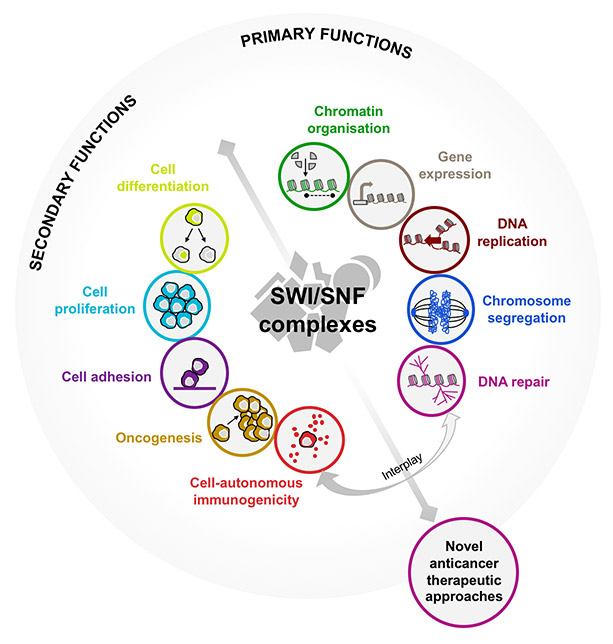DNA repair, chromatin remodeling and epigenetics
This team belongs to the UMR 981 - Molecular predictors and new targets in oncology.
DNA, which encodes the genetic program of the cell, can be compared to the letters of a book’s words. In order to properly understand the meaning of a story, the words need to be properly spelled and the punctuation needs to be correct. In a cancer cell, the DNA accumulates spelling errors and the punctuation is altered. These phenomena result, respectively, from DNA repair defects and epigenetic dysregulation. They eventually cause cancer, by corrupting the cell’s normal program.
Our research objectives are as follows:
- understanding DNA repair defects and epigenetic dysregulation;
- identifying novel therapeutic strategies that specifically target DNA repair defects and epigenetic dysregulation;
- assess, within dedicated clinical protocols, the efficacy of the most promising treatments in patients, thanks to the collaboration with Gustave Roussy Hospital.
We are particularly focusing on lung cancer and sarcoma, but are also interested in other tumor types.
Research topics
Chromatin remodeling is a biological process that allows modifying gene expression without changing the corresponding DNA sequence. It plays an important role in oncogenesis, tumor progression and therapeutic resistance. The SWI/SNF complex is a key player of chromatin remodeling in cancer.
There is currently no approved therapy that specifically targets SWI/SNF defects in cancer, which occur in more than 20% of all solid tumors. Our research team aims at identifying novel therapeutic approaches that specifically target SWI/SNF-defective tumors, in order to improve patient care.
More specifically, our projects aim to:
- Systematically explore novel potential treatments through high-throughput screenings on cellular models
- Understand the mechanism of action of candidate drugs and explore the associated resistance mechanisms
- Evaluate candidate drugs’ efficacy in vivo
- Develop the corresponding clinical protocol, in close link with the Gustave Roussy Hospital
- Develop the corresponding biomarkers in order to allow appropriate identification of patients that may benefit from such approaches
We more precisely focus on the role of SWI/SNF on DNA repair processes and anti-tumor immunity, especially in lung cancer, renal cell carcinoma and sarcoma. We notably investigate how DNA repair defects and epigenetic dysregulation influence anti-tumor immunity, by using in vitro or in vivo models, as well as tumor material. We follow a multidisciplinary and integrated approach, which combines molecular biology, cell biology, imaging, bioinformatics and high-throughput multi-omics molecular characterization.

Summary Figure: Overview of the roles of SWI/SNF in cancer that represent potential therapeutic targets; our team focuses on DNA repair and cell-autonomous immunity. Adapted from Chabanon et al, Semin in Cancer Biology 2019.
